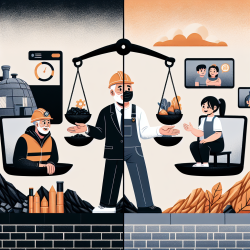Introduction
In the realm of online therapy services, particularly those aimed at children, the safety and efficacy of therapeutic practices are paramount. Drawing insights from diverse industries can offer valuable lessons for enhancing safety and outcomes in online therapy. A study titled "The Safety Attitudes of Senior Managers in the Chinese Coal Industry" provides a compelling case for how managerial attitudes towards safety can significantly influence organizational practices and outcomes. This blog explores how practitioners in online therapy can leverage these insights to improve their services.
Understanding the Study
The study conducted by Zhang et al. (2016) evaluated the safety attitudes of senior managers in the Chinese coal industry over a period from 2009 to 2014. The research focused on 15 safety concepts and revealed significant improvements in nine of these concepts due to enhanced social and legal environments, safety culture, and technological advancements. However, it also highlighted areas of decline due to inadequate awareness of safety's economic benefits and insufficient safety communication.
Key Insights for Online Therapy Practitioners
While the context of the study is the coal industry, the underlying principles of safety attitudes and their impact on organizational practices are universally applicable. Here are some key takeaways for online therapy practitioners:
- Emphasize Safety Culture: Just as the coal industry benefited from a robust safety culture, online therapy providers should foster a culture of safety and accountability. This includes ensuring secure digital platforms and protecting client confidentiality.
- Leverage Technology: Technological advancements played a crucial role in improving safety in the coal industry. Similarly, online therapy can benefit from cutting-edge technologies that enhance service delivery, such as AI-driven assessments and secure communication tools.
- Promote Economic Benefits of Safety: The study highlighted a lack of awareness about the economic benefits of safety. Online therapy providers should articulate how investing in safety measures, such as training and secure systems, can lead to long-term cost savings and improved client outcomes.
- Enhance Communication: Effective communication about safety practices is vital. Practitioners should ensure that all stakeholders, including therapists, clients, and families, are informed about safety protocols and the importance of adhering to them.
Encouraging Further Research
While the study provides valuable insights, it also underscores the need for ongoing research into safety attitudes and practices across different sectors. Online therapy practitioners are encouraged to conduct their own research to identify specific safety challenges and opportunities within their field. This data-driven approach will not only enhance safety but also improve therapeutic outcomes for children.
Conclusion
By adopting a proactive stance on safety, informed by data and research from other industries, online therapy practitioners can create a secure and effective therapeutic environment. This commitment to safety will ultimately lead to better outcomes for children, aligning with the core mission of providers like TinyEYE.
To read the original research paper, please follow this link: The Safety Attitudes of Senior Managers in the Chinese Coal Industry.










